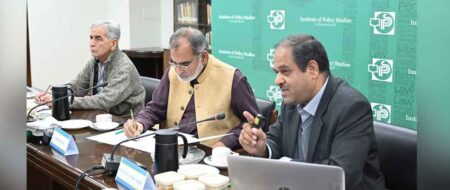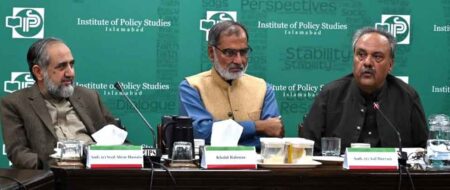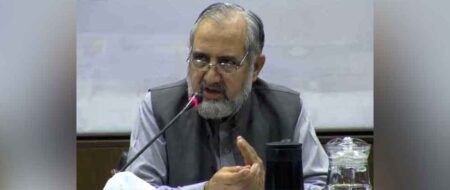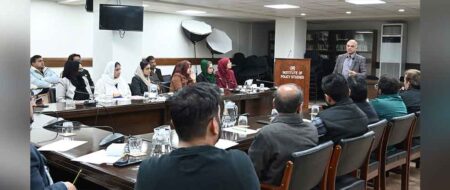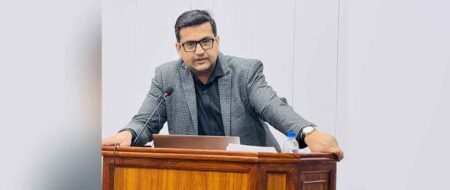‘The Role of Religions in Fostering Peace, Harmony, and Justice’
Scholars and leaders of six faiths explore religion’s role in fostering global peace and harmony
There is an inseparable link between the role of religions and peace and development, as no society can flourish without the foundations of harmony, justice, and mutual respect. This connection has global significance, with particular relevancy for Pakistan, as collective efforts are essential to bridge divides, foster inclusivity, and pave the way for sustainable development and equitable growth.
These views were shared by Ahsan Iqbal, federal minister for Planning, Development, and Special Initiatives, while speaking as chief guest at the inaugural session of an international seminar, ‘The Role of Religions in Fostering Peace, Harmony, and Justice’, organized on December 4, 2024 by the Institute of Policy Studies (IPS), Islamabad, in collaboration with Allama Iqbal Open University (AIOU), National University of Modern Languages (NUML), Islamabad, University of Management & Technology (UMT), Lahore, Gift University, Gujranwala, The Islamic Foundation (IF), UK, and Markfield Institute of Higher Education, UK.
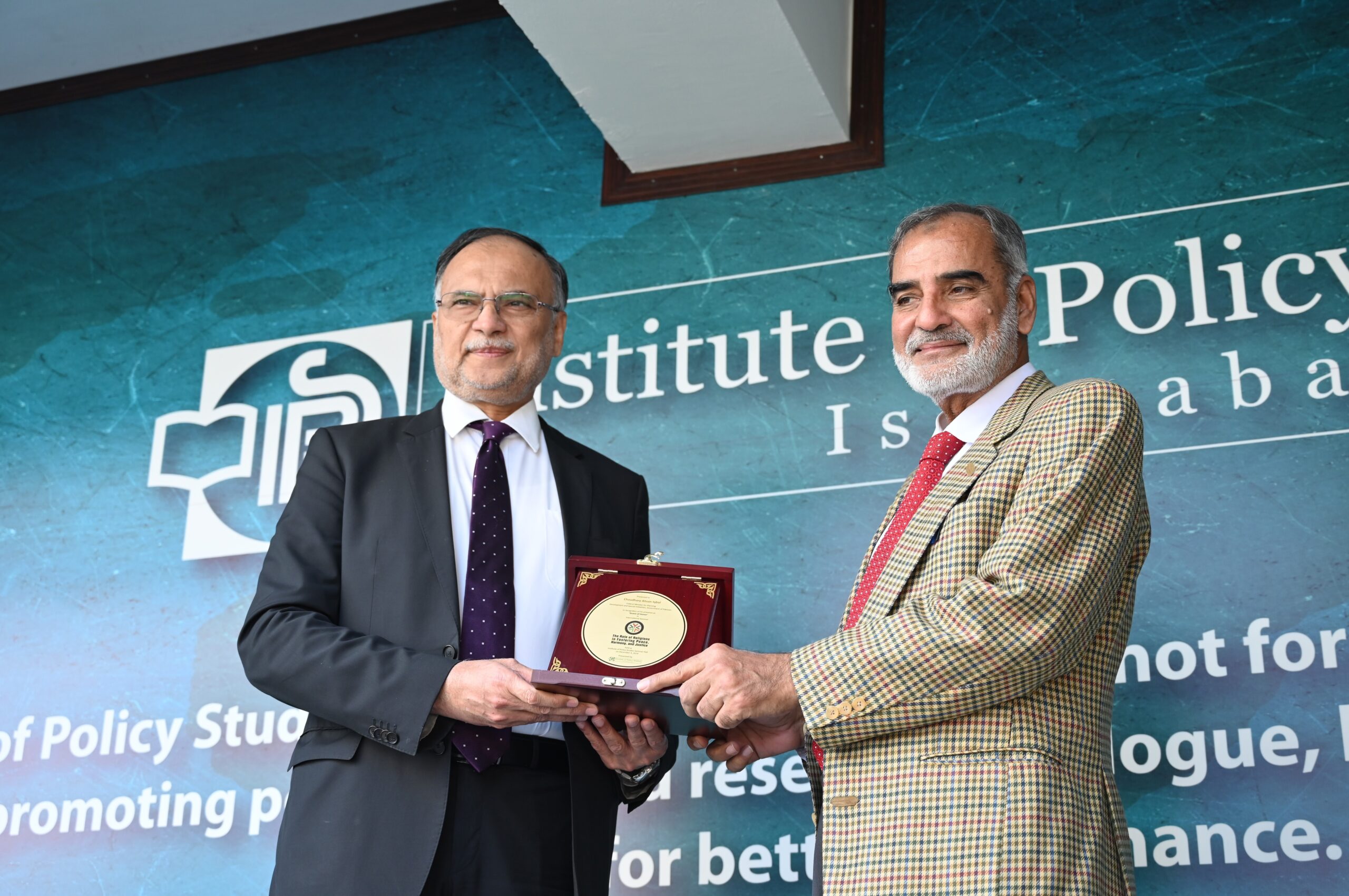
The seminar’s inaugural session was addressed as keynote speaker by Dr Tamara Sonn, professor emerita, Georgetown University, Washington D.C. Chairman IPS Khalid Rahman also spoke on the occassion, whereas messages from Prof Khurshid Ahmad, founder and patron-in-chief of IPS, and Khurshid Ahmad Nadeem, chairman National Rahmatul-Lil-Aalameen Wa Khatamun Nabiyyin Authority, were also read out.
The next two sessions of the event brought together voices from Islam, Christianity, Hinduism, Sikhism, Buddhism, and Judaism to explore how shared ethical values and consciously practiced faith can bridge divides, counter misconceptions, and create a foundation for global unity, highlighting the potential of dialogue among followers of different faiths to address contemporary challenges and promote inclusive narratives rooted in mutual respect and understanding.
The second session, chaired by Justice Dr Qibla Ayaz, member, Shariat Appellate Bench, Supreme Court of Pakistan (SCP), was addressed by Rev Fr Prof Sarfraz Simon, diocesan director of Catholic Church, Dr Neelima Shukla-Bhatt of Wellesley College, USA, Dr Kalyan Singh Kalyan of GC University, Lahore, Dr Samantha Ilangakoon of University of Peradeniya, Sri Lanka, Dr Ophira Gamliel of University of Glasgow, and Dr Hafiz Waqas Khan of Riphah International University (RIU), Islamabad.
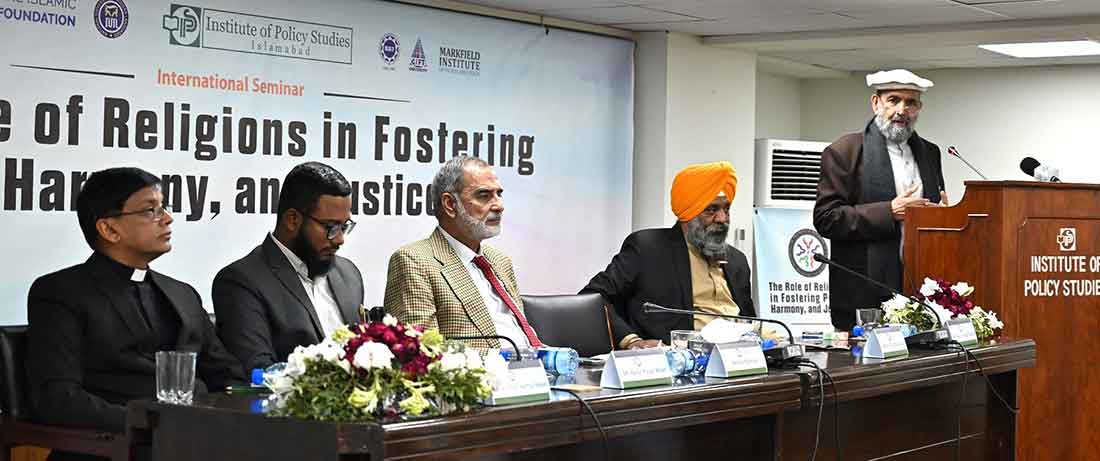
This was followed by a panel discussion chaired by Dr Khalid Masud, member judge, Shariat Appellate Bench, SCP, and Dr Zahid Parvez, rector, Markfield Institute of Higher Education, UK, featuring Dr Mary Hunter, post-doctoral researcher, St Leonard’s associate of the University of St Andrews, Scotland, Dr Taimia Sabiha, assistant professor, International Islamic University, Islamabad, Dr Seema Farzad, social activist, and Manzoor Masih, member National Commission for Human Rights.
The seminar’s concluding session was addressed by Justice Dr Syed Muhammed Anwer, judge, Federal Shariat Court, alongside Chairman IPS Khalid Rahman, IPS’ Vice Chairman Ambassador (r) Syed Abrar Hussain, and Prof Dr Mohyuddin Hashmi, dean, Faculty of Arabic and Islamic Studies, Allama Iqbal Open University, Islamabad.
The day-long event gathered international and local speakers, scholars, religious leaders, policymakers, and civil society to discuss religion’s transformative role in tackling humanity’s key challenges.
Ahsan Iqbal highlighted the enduring wisdom of faith traditions, emphasizing their universal principles of human dignity, non-violence, and compassion. Drawing on teachings from Islam, Christianity, Judaism, Hinduism, Buddhism, and Sikhism, he noted that these shared values underpin harmonious and progressive societies. However, he expressed concern over rising intolerance and hate, which fuel extremism and hinder harmony and inclusivity. He underscored the importance of fostering a narrative rooted in tolerance.
Prof Khurshid Ahmad, in his message, emphasized religion’s role in addressing spiritual needs, calling it a fundamental necessity throughout history. He warned that modern civilization’s departure from religion has led to injustice, oppression, and discord. As humanity grapples with materialism, nationalism, and neocolonialism, Prof Ahmad urged faith communities to foster harmony through moral appeal rather than coercion, offering ethical guidance to counter today’s challenges. He described Islam’s principles as fostering progress, justice, and harmony.
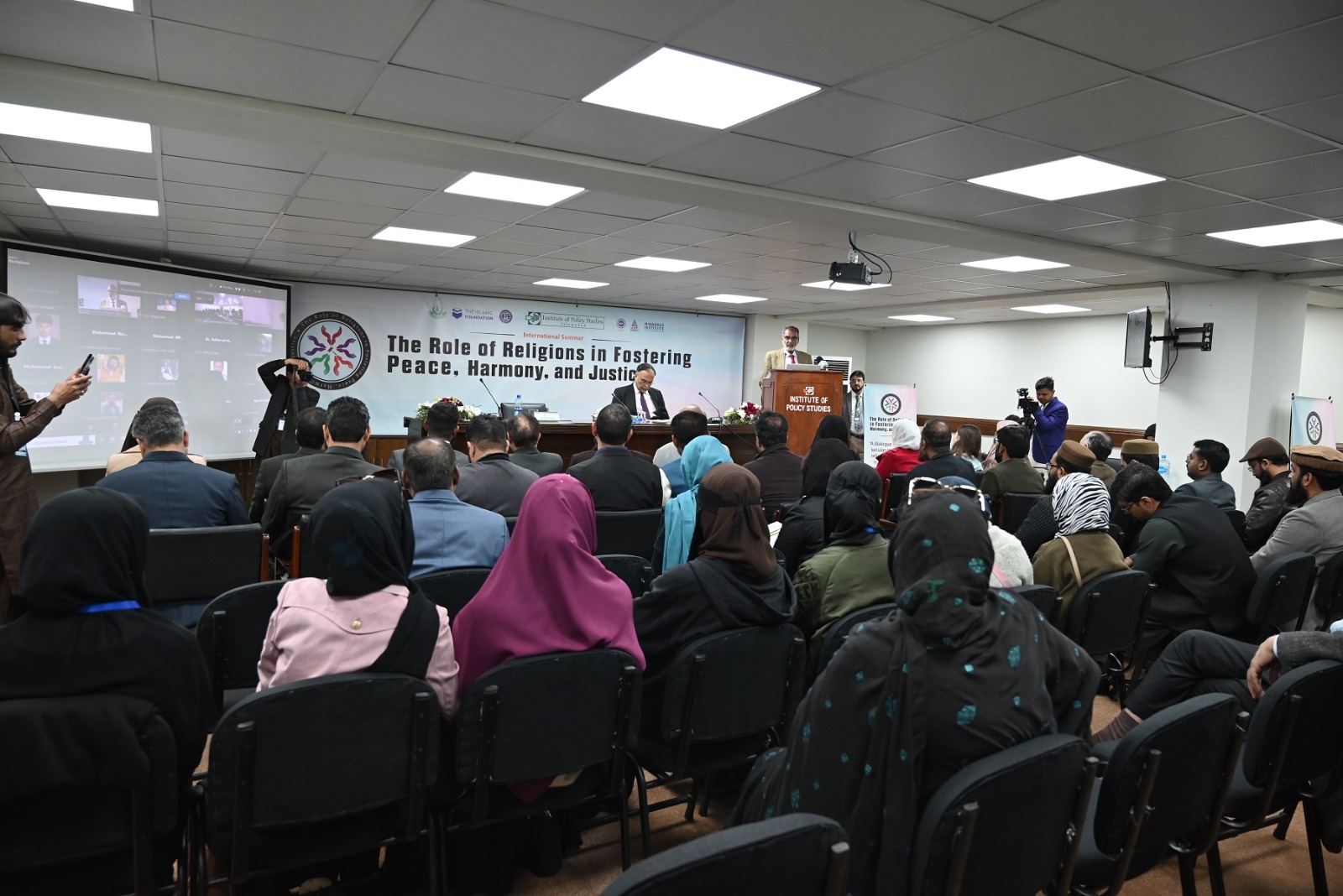
Dr Tamara Sonn highlighted religion’s paradoxical role in conflicts, noting its unparalleled potential to resolve disputes despite often being seen at their core. She warned against religious nationalism, calling it manipulative and destabilizing, and urged societies to embrace universal values of justice, humanity, and equality. Stressing the importance of values over identities, she remarked, “It is not the faith we are born into but the values we embody that define a person’s merit.” Dr Sonn advocated interfaith collaboration through a “dialogue of action” to address shared challenges.
Khurshid Nadeem’s message underscored religion’s enduring relevance, highlighting secularism’s failure to provide a comprehensive moral framework. He stressed that religion remains essential to addressing fundamental human needs for meaning and guidance, especially in today’s moral crises.
Khalid Rahman accentuated the decisive role of human behavior in shaping religion’s influence, emphasizing that “religions are not inherently divisive; their impact depends on how they are practiced and interpreted.” He highlighted how religion is often misused to incite violence and exclusion, overshadowing its core values of compassion and justice.
Rahman pointed out that clashes often arise not because of inherent differences but due to mismanagement of diversity, personality clashes, and competing group interests. Rahman stressed the need for inclusive strategies to resolve conflicts, bridge divides, and address socioeconomic disparities, emphasizing that humanity’s strength lies in its diversity
Inclusiveness is inherent in all religions, said Dr Qibla Ayaz. However, the media’s attention to adverse incidents while overlooking positive contributions fuels religious nationalism. He suggested that religious advocates, policy influencers, and followers of religion must take collective responsibility to bridge gaps, promote unity, and use social media to amplify messages of inclusivity.
Highlighting Islam’s message of peace, justice, forgiveness, and respect for diversity, Dr Hafiz Waqas noted that the term “Islam” itself signifies peace. He emphasized Islam’s commitment to equality and the message of reconciliation and moral leadership in fostering harmony and justice, as outlined in the Qur’an and Sunnah.
Reflecting on Christianity’s ethos of peace, Prof Simon underscored that true peace stems from “trust in God and harmonious relationships.” He stressed that freely chosen and consciously practiced faith is crucial in preventing religious violence and fostering a culture of peace.
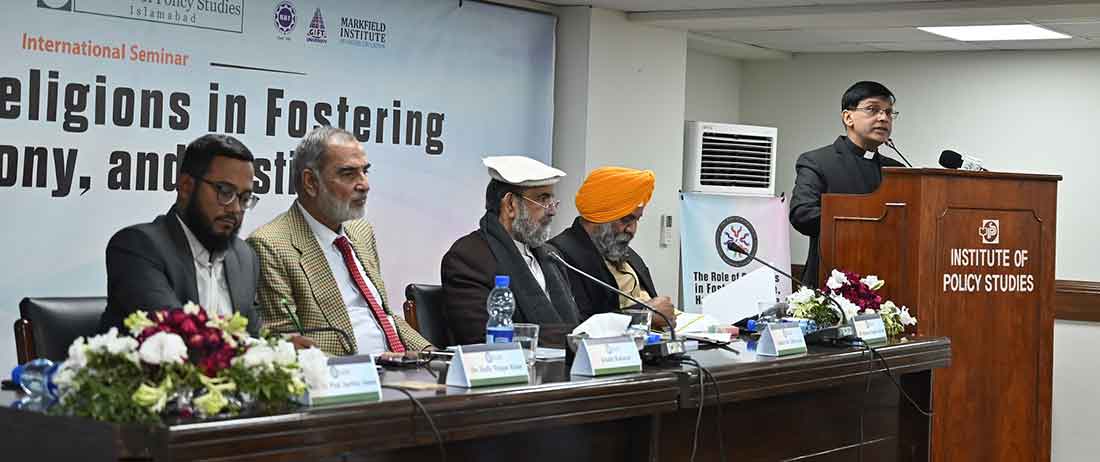
Dr Neelima underscored Hinduism’s inherent pluralism, rooted in the Rig Vedic principle of “welcoming noble ideas from all directions.” She highlighted ‘religious tolerance’ and ‘acceptance of diversity’ as key Vedic principles to global harmony.
Quoting Sikh teachings on self-reflection and generosity, Dr Kalyan stressed the need to overcome misunderstandings and misconceptions about other religious teachings.
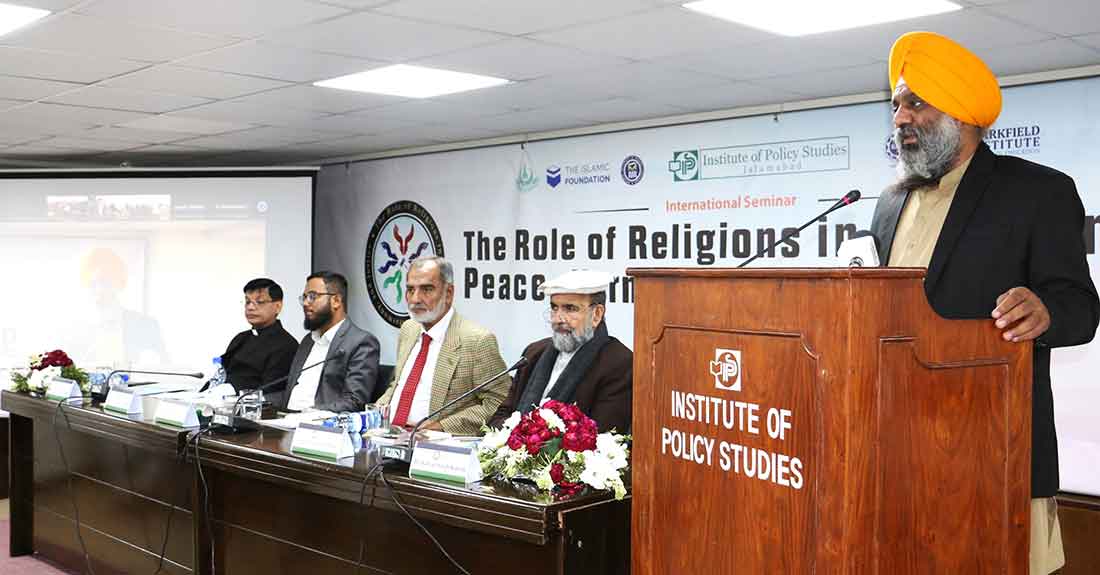
Dr Ilangakoon shared the Buddhist ethical framework, which focuses on refraining from evil, doing good, and purifying the mind while emphasizing the belief in the egalitarian nature and potential for liberation in all humans.
Highlighting the Jewish principle from Deuteronomy to “pursue justice,” Dr Gamliel shared heritage and interconnections between religious traditions over millennia.
The panel speakers connected these perspectives to contemporary global challenges, urging interfaith dialogue and solidarity to strengthen common values in the pursuit of peace. They emphasized the need for collective action, using shared ethical teachings as a unifying force for change.
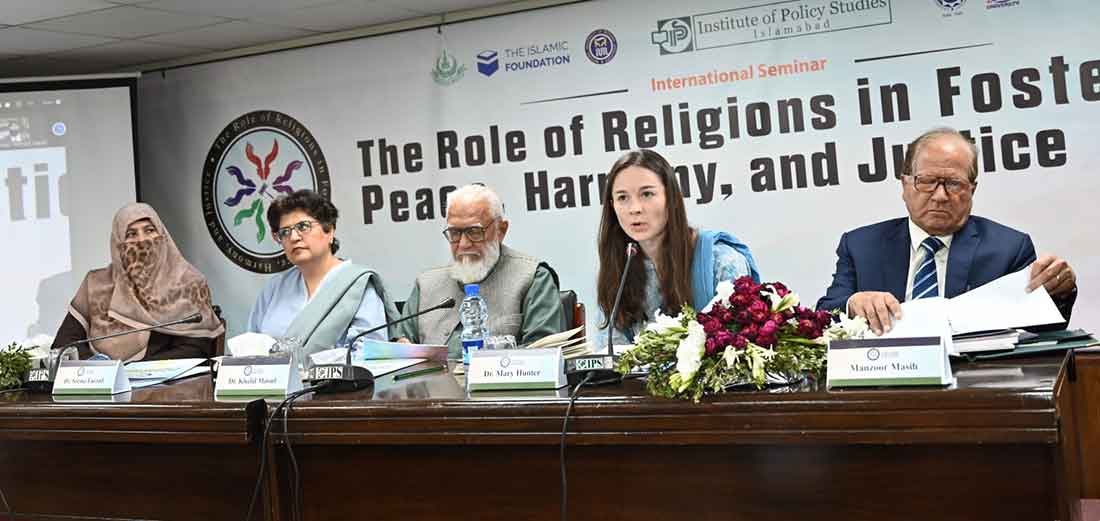
In his remarks, Dr Khalid Masud emphasized that religious dialogue should evolve into a global movement for human rights, transcending specific beliefs. He highlighted the adaptability of religious principles in fostering cross-cultural harmony and stressed the need to address global issues, like the Israel-Palestine conflict, with humanity as the core principle.
In his concluding remarks for the panel discussion, Dr Zahid Parvez highlighted the transformative power of religion and community-led initiatives in fostering unity and addressing global challenges. He called for decolonizing education and using interfaith dialogue to influence policy for justice and social cohesion.
In the last session of the day-long event, Justice Syed Anwer drew attention to Pakistan’s unique constitutional and symbolic recognition of religious minorities, highlighting the reflection of religious inclusivity in the national flag and its definition of minorities. Unlike many nations, Pakistan’s framework considers minorities solely based on religious beliefs, not caste, color, or creed, ensuring equal constitutional rights for all citizens. However, he acknowledged that the ideal of equality is not always reflected in practice, urging a renewed focus on teaching and promoting the true values of religion.
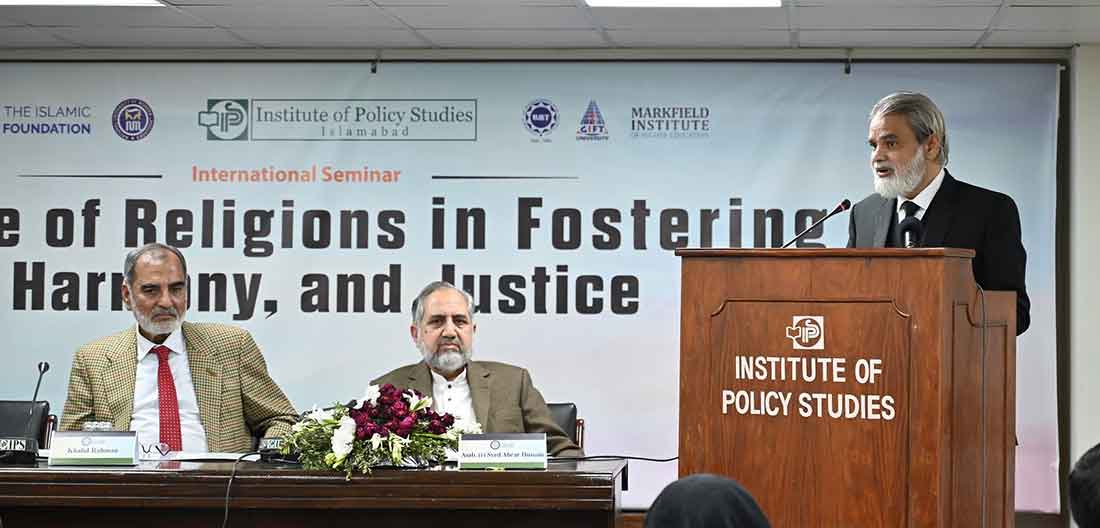
Exploring the contrasting experiences of minorities in secular and religious states, the speaker pointed out that secular states often face challenges in ensuring the safety and rights of their minority populations. He emphasized the multifaceted nature of the issue, noting that faith communities need to prioritize the dissemination of their core messages of peace and mutual respect.
Presenting his insights on the way forward, Khalid Rahman underscored the complexity of creating a just environment, emphasizing that the prevailing narratives and structures are often shaped by powerful elites who primarily benefit from the status quo. He stressed that the challenges attributed to religion are equally rooted in governance and decision-making processes dominated by these elite groups.
He argued that the inequities and conflicts observed globally are not the result of religious teachings but stem from systemic issues perpetuated by those in authority. Highlighting the global arms trade as an example, he noted that the largest weapons producers are also the nations advocating peace, illustrating the contradictions in elite-driven policies.
He called for a critical examination of governance structures and the roles of all stakeholders, urging a shift from assigning blame to religion toward addressing the socio-political systems and economic interests that drive inequality and conflict.
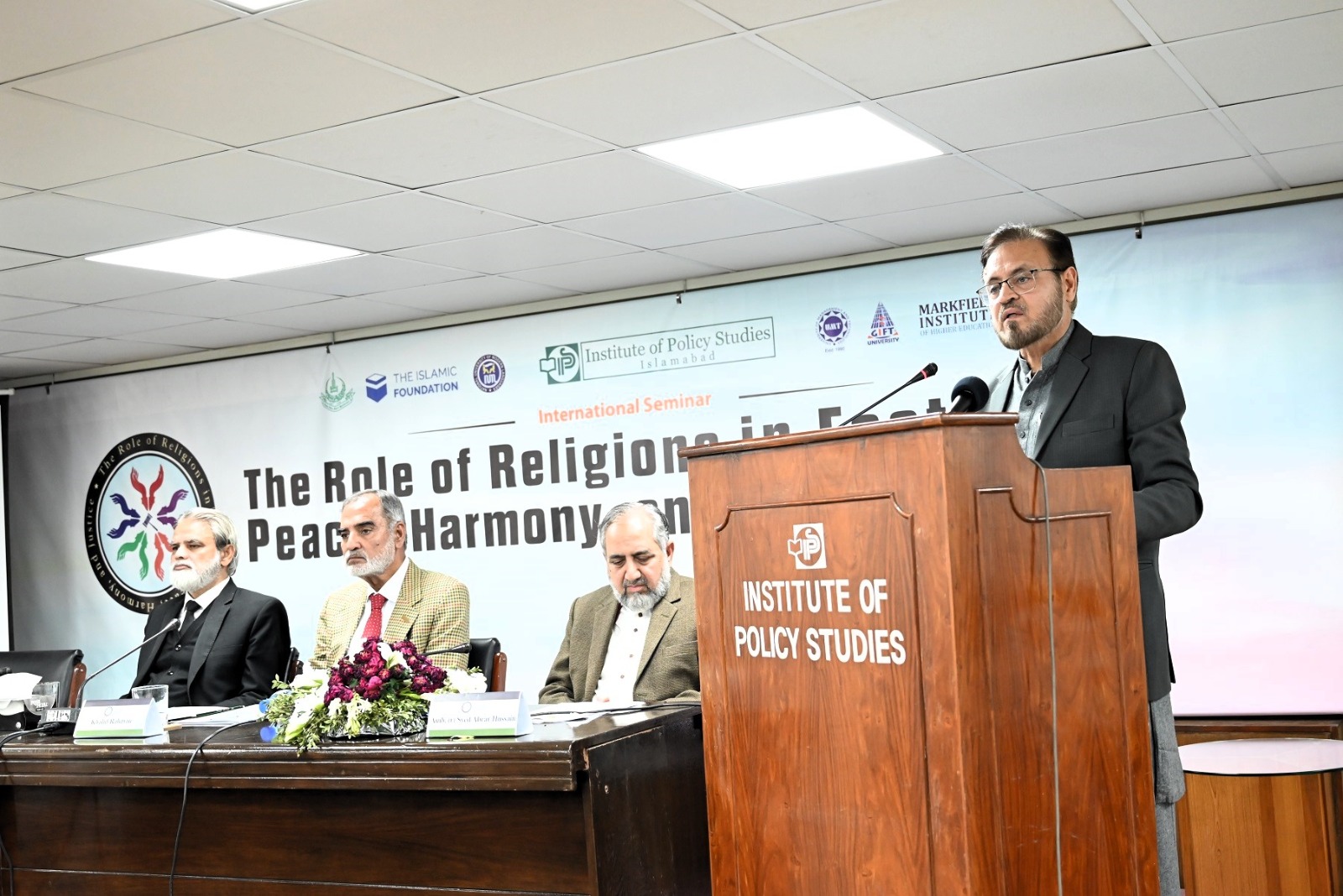
Earlier, Ambassador Abrar Hussain shared the key takeaways from the day-long seminar, noting the enduring relevance of religion in addressing humanity’s quest for peace, justice, and harmony amidst modern challenges. He emphasized that while secularism and irreligiosity dominate many societies, religions continue to offer a unique moral framework essential for fostering inclusivity, empathy, and coexistence. He reiterated that faith communities must introspect and engage collaboratively, focusing on moral appeal over coercion, to counter the misuse of religion for violence, prejudice, or political agendas.
The session concluded with a call for collective responsibility by Dr Mohyuddin Hashmi. He urged religious leaders and communities to counter violence and prejudice, prevalent across all religions, by teaching and embodying the true essence of their faiths.
The speakers observed that the adaptability of religious teachings in diverse contexts demonstrates their potential to bridge gaps, transforming dialogue into tangible change and offering hope for a future rooted in shared ethical values.
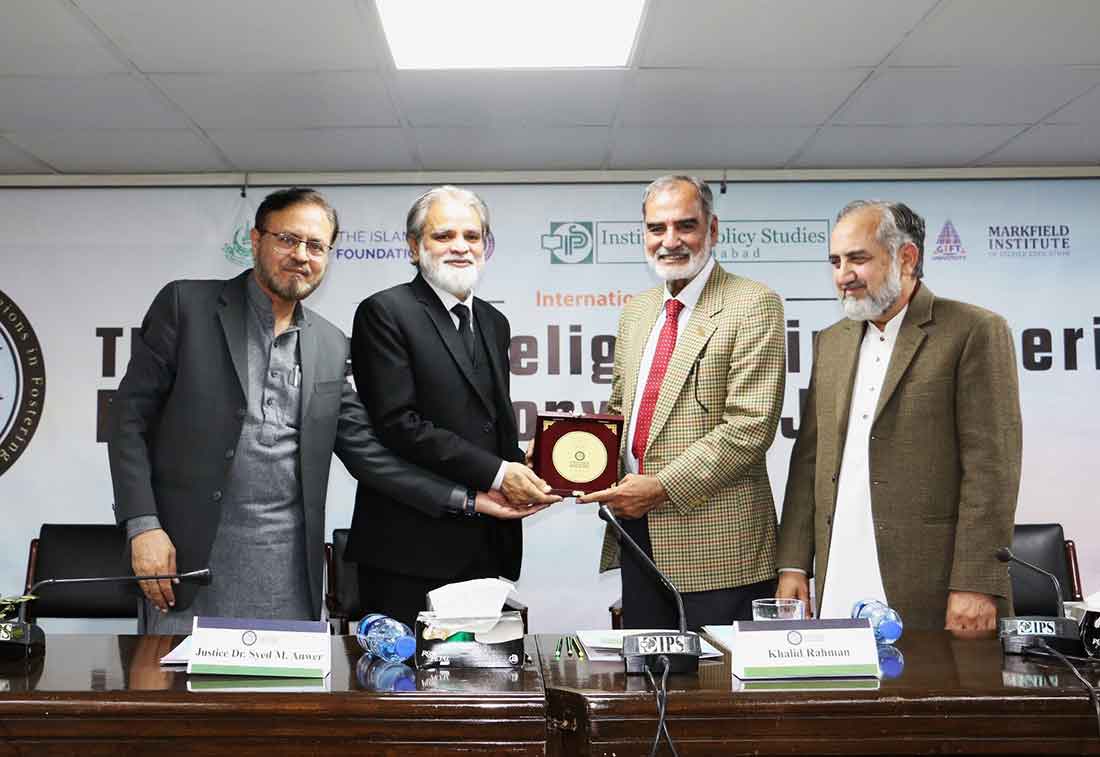
|
IPS TV |
| The shared religious values provide foundations for fostering understanding, resolving conflicts |
The first human rights charter was the last sermon of the Prophet Muhammad (PBUH) | Dr Kalyan Singh |
| Highlights of International Seminar ‘The Role of Religions in Fostering Peace, Harmony and Justice’ |
Pakistan is the only country in the world having reflection of minorities in its flag | Justice Dr Syed Mohammad Anwer |
| ‘The Role of Religions in Fostering Peace, Harmony and Justice’ | Closing Remarks by Chairman IPS |
Religions ethics set the standard of what is, and isn’t acceptable | Rev Fr Prof Sarfraz Simon |
| The contributions of many religions is not taught in the curriculums | Dr Zahid Pervez (UK) |






